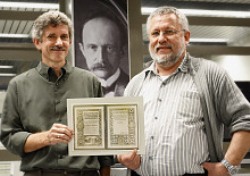Dec 12 2013
December 14 in the year 1900 is commonly deemed birthday of quantum theory. It is relsted to a lecture given by Max Planck, who was born in Kiel. Physicists of Kiel University have now compiled an exhibition devoted to the famous Nobel laureate. The President of Kiel City Council Hans-Werner Tovar will open it on Saturday, December 14, at Kiel University’s physics centre – the 113th birthday of the theory, which revolutionised the natural sciences.
 They brought Max Planck „back home“: Michael Bonitz and Frank Hohmann with a facsimile of Planck’s Nobel prize certificate. Copyright/Photo: CAU/Schimmelpfennig
They brought Max Planck „back home“: Michael Bonitz and Frank Hohmann with a facsimile of Planck’s Nobel prize certificate. Copyright/Photo: CAU/Schimmelpfennig
It was just one among many lectures given by Max Planck before the Deutsche Physikalische Gesellschaft (German Physics Association, DPG) on this day in the year 1900. He presented his results on the radiation of the so-called “black body radiation”, particularly his hypothesis on this radiation’s quantization, which was entirely incomprehensible at this time. Then, neither Planck nor his audience could foresee that this December 14 would go down in history: In fact, with his “quantum hypothesis” Planck ushered in a revolution of physics, chemistry and all of the natural sciences. And not only that: His discovery also lead to a revolution in technology, which includes mobile phones, computers, nanotechnology and the internet.
Beside his scientific achievements, for which he was awarded the Nobel Prize in physics in 1918, Max Planck rendered invaluable services to German science. It was his outstanding international reputation, which made it possible to secure the continuation of the most important research institutes in Germany after the Second World War. His personal commitment spawned the establishment of the Max Planck Society (MPG). For these reasons, science and politics in Germany commemorate Planck regularly with symposiums and public lectures, most recently in Berlin in 2008 and most likely again in April 2058, Planck’s 200th birthday.
The fact that Planck was born in Kiel for many people is just a footnote in his curriculum vitae. “Very few people know that Planck had his first professorship at Kiel University, from 1885 to 1889. All his life he kept a deep personal bond with Schleswig-Holstein and his hometown”, says Professor Michael Bonitz from the Institute of Theoretical Physics and Astrophysics, who managed the exhibition’s installation. Kiel, too, was a site of the celebrations of Planck’s 150th birthday in 2008, when the idea arose to honour the physicist, who is also honorary citizen of Kiel and honorary senator of Kiel University, with the establishment of a museum.
The first step towards this goal has now been done. The exhibition in Kiel University’s physics centre shows, on the one hand, Planck’s road of life and his diverse relationships with Kiel by means of many interesting historical documents, which were found in the archives of Schleswig-Holstein. On the other hand, the exhibition focuses on Planck’s scientific discovery of the radiation quantum and its consequences for the natural sciences. Moreover, his research during his time in Kiel is presented. “The exhibition addresses students and pupils, who are interested in the natural sciences and engineering, as well as everyone, who is curious about Planck’s exciting life”, Bonitz explains. Many high-quality exhibits are loans of the Max Planck Society. Additionally, several original documents from the archives of the MPG will be shown till the end of February 2014.
The exhibition will be opened on December 14, 10 a.m., at Kiel University’s physics centre. Everyone is cordially invited. More information about the exhibition and the opening programme can be retrieved at www.theo-physik.uni-kiel.de/~bonitz/planck.html.